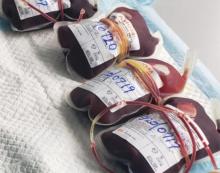World Blood Donor Day- stakeholders advocate for more measures for safer blood donation
Abuja, 15 June 2020 - On June 14 2020, Nigeria commemorated the World Blood Day and stakeholders are asking for measures for the supply of safe blood, especially during emergencies and outbreaks such as COVID-19.
“We need the current blood safety bill which advocates for proper regulation of donated blood to be enacted by the legislators. Strong advocacy on a high level is also needed to see blood donation as an essential part of the health systems in Nigeria”, says Dr Omosigho Izedonmwen of National Blood Transfusion Service (NBTS) Abuja Center.
He further adds that “during this COVID-19 pandemic we lost quite a lot of blood, over 200 units expired in the Abuja NBTS center resulting from the lockdown in the country. Much more were lost in other States and the figures are quite alarming. We are currently calling on our existing donors to come forward and donate, we are also working on starting a campaign that would bring in new donors.”
The World Blood Donor Day campaign theme for 2020 is “Safe blood saves lives”. The slogan “Give blood and make the world a healthier place” focuses on the idea that blood donors give the gift of life and that blood donations are needed all over the world to ensure individuals and communities have access to safe and quality-assured blood and blood products. The theme and the slogan combined as a call to action to governments, national health authorities and national blood transfusion services to provide adequate resources and put into place systems and infrastructures to increase the collection of blood from Voluntary, Non-Remunerated Blood Donors (VNRBD); to provide quality donor care; to promote and implement appropriate clinical use of blood; and to set up systems for the oversight and surveillance on the whole chain of blood transfusion.
Access to safe blood is a privilege of the few. Most low- and middle-income countries struggle to make safe blood available because donations are low and equipment to test blood is scarce. Globally, 42% of blood is collected in high income countries, which are home to only 16% of the world’s population.
Currently, Nigeria National Blood Transfusion Service has 17 blood donation centers across six geo political zones which leads to collection of over 60 000 units of blood annually but has recorded a dwindling rate of donation in 2019 as only around 25 000 units were donated.
In her message to commemorate 2020 World Blood Donor Day, WHO Regional Director for Africa Dr Matshidiso Moeti said, “during this COVID-19 pandemic, the supply of safe blood is at risk. Regular blood donation drives are being postponed, and stay-at-home orders and fear of infection are preventing donors from accessing services. Disruptions to the global supply chain also put countries at risk of shortages of critical supplies and equipment needed for blood donation and transfusion.”
She calls on people to donate more in order to save lives “this year we are calling on people to “give blood and make the world a healthier place” because by regularly volunteering to donate blood, we can all contribute to solidarity and saving lives.”
WHO Nigeria has been providing support to NBTS in the drive for blood donation through the monitoring of the database for blood safety on the national instance of the District Health Information System 2 which was launched with the support of WHO for the reporting of the blood donation in the country. Preliminary discussion is going on with Facebook for the launch of a tool to increase the database of potential blood donors in the country and also use it for targeted alert on need for blood donation.
Technical Contact:
Mr Omotayo Hamzat; Email:hamzato [at] who.int; Tel: +234 803 332 2870




